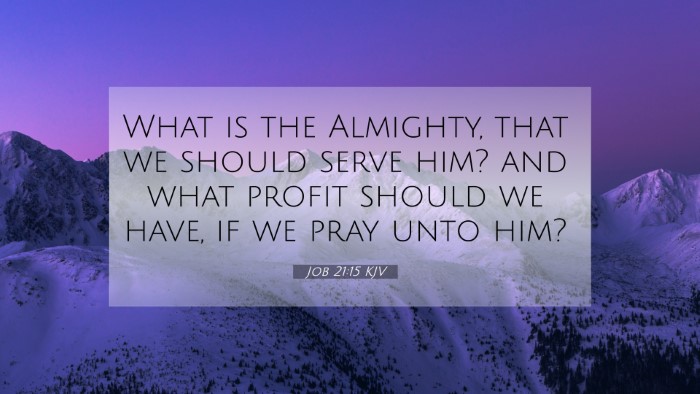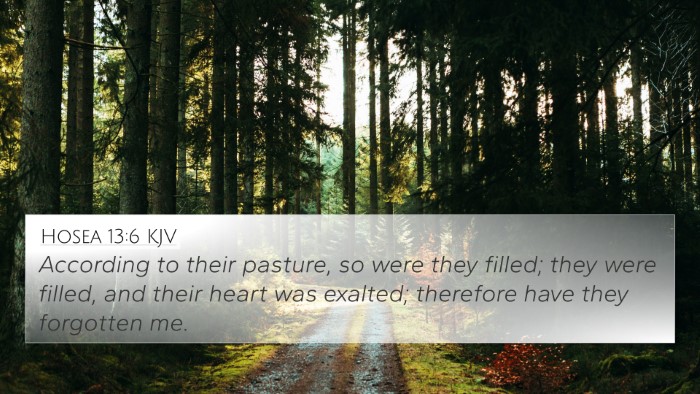Understanding Job 21:15
Verse: Job 21:15 - "What is the Almighty, that we should serve him? And what profit should we have, if we pray unto him?"
The verse presents a poignant question from Job regarding the nature of divine justice and the perceived futility of serving God amidst suffering. This inquiry encapsulates themes of doubt, righteousness, and the human condition in relation to God.
Commentary Insights
Matthew Henry Commentary
Matthew Henry emphasizes the frustration and despair of Job in the face of his suffering. He points out that Job's questions are not mere complaints but profound inquiries concerning the value of piety in light of the wicked prospering. Henry suggests that this reflects a truth about human nature: a tendency to question God when circumstances turn dire.
Albert Barnes Commentary
Albert Barnes elaborates on Job's skepticism regarding the advantages of serving God when it seems the ungodly thrive without consequence. Barnes underlines the historical context of Job's situation, indicating that righteous living does not always yield immediate rewards, which further complicates the understanding of divine justice.
Adam Clarke Commentary
Adam Clarke interprets the verse as Job articulating a common struggle within faith: understanding why one should maintain integrity when injustices appear prevalent. Clarke suggests that this reflects a deep theological inquiry into God’s motives and the apparent lack of immediate reciprocity for worship and prayer.
Biblical Cross References
Job 21:15 connects with several other Bible verses that explore themes of suffering, divine justice, and the motivations behind faith:
- Psalms 73:12-14: This passage reflects the same frustration as the psalmist grapples with the prosperity of the wicked.
- Malachi 3:14-15: Highlights a similar sentiment of questioning the profit of serving God amidst seeming injustice.
- Ecclesiastes 7:15: Deals with the seeming randomness of righteous suffering contrasted with wicked prosperity.
- Romans 8:28: Offers comfort in the belief that God ultimately works all things for good, even through suffering.
- James 1:12: Encourages perseverance under trials, suggesting a reward for those who remain faithful.
- 2 Corinthians 4:17-18: Discusses the temporary nature of suffering compared to eternal glory.
- Hebrews 11:6: Stresses the importance of faith and belief in God's character, serving as a counter to doubt.
- Job 10:8-9: Job laments his creation and questions God's motives, paralleling the doubts in Job 21:15.
- Job 24:1: Job again questions why the Almighty does not set times for judgment, tying back into his concerns here.
- Isaiah 53:3: Highlights the suffering of the righteous and their rejection, resonating with Job’s predicament.
Thematic Connections
This verse aligns with several significant themes in Scripture that merit exploration:
- The Nature of Suffering: Job's inquiry directly addresses the reality of suffering faced by the righteous.
- Divine Justice: Questions the fairness of God’s governance and the prosperity of the wicked.
- Prayer and Its Purpose: Raises doubts about the effectiveness of prayer in the face of adversity.
- The Search for Meaning: Highlights the human quest for meaning amidst life's injustices.
Tools for Bible Cross-Referencing
To dive deeper into the interconnectedness of scripture and facilitate understanding, several resources can be utilized:
- Bible Concordance: A tool that lists words and their occurrences, helping in finding related verses.
- Bible Cross-Reference Guide: A comprehensive list of verses that connect thematically.
- Cross-Reference Bible Study: Techniques to systematically explore Bible verses that interact with each other.
- Bible Reference Resources: Various tools to aid in studying thematic connections.
Practical Application
In utilizing cross-references, one can find comfort and understanding through the interconnected narratives and teachings of the Bible. Understanding Job 21:15 through these connections allows believers to grasp the broader narrative of divine love, justice, and human suffering.
Conclusion
Job 21:15 serves as a profound inquiry into the nature of faith amidst suffering. By cross-referencing biblical texts and exploring the insights offered by respected commentaries, individuals can gain a deeper understanding of not only Job's lament but also the broader themes of justice, faith, and the complexity of God's relationship with humanity.













